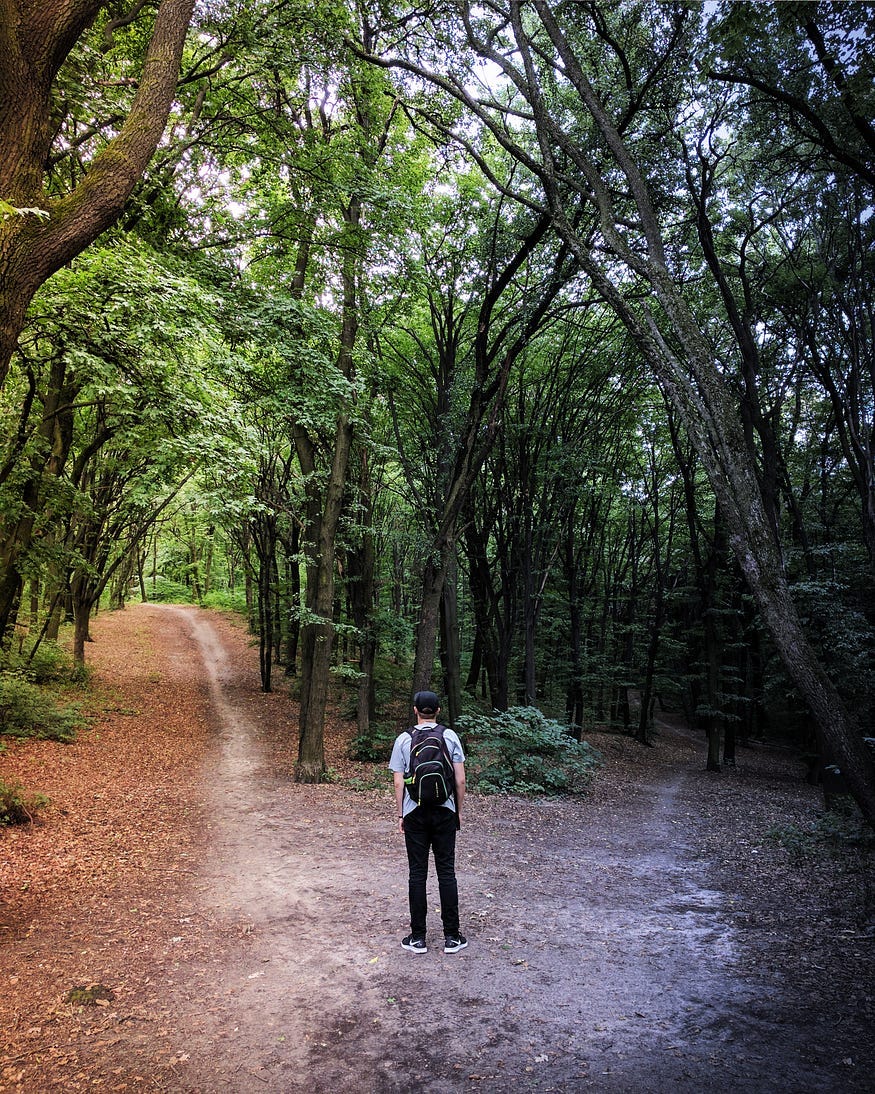This post is free to read for the next 7 days. After that, it will be available to paid subscribers only. Upgrade your membership for complete, ongoing access to our full archive.
Writers can be sticky.
No matter how sleek and streamlined we try to be, we’re prone to getting stuck in our stories.
One minute the big, shiny narrative locomotive’s chugging along at speed, and the next, it’s come to a screeching halt on the tracks.
It’s not derailed. It’s just stuck.
If you’ve ever written fiction, I’m sure this has happened to you at least once. Maybe you’re right in the middle of an intense scene. Your protagonist whips out his agency-issued firearm, levels it at the bad guy, and says… says…
And that’s it. Bang, right out of the blue. Stuck.
This happens to me several times in the course of writing a novel. Sometimes I’m stuck for a day. Sometimes for a week. It even lasted as long as a month when writing my first book (but I got there in the end).
So when you find yourself slopping through the mud and not making any real progress on the story you once pictured so clearly in your head, what do you do?
Ad | Audience Builder for Beginners: How to build an e-mail list for free
“Build your e-mail list of high-quality subscribers from absolute 0.
What does it mean to have high-quality subscribers? You don’t want people to give you an e-mail account they don’t use just to get your freebie. SO MANY e-mail lists are full of 123@gmail.com e-mail accounts.
Not on my watch!
This is about building a highly engaged e-mail list faster than you thought possible. We’ll aim at getting you your first 1000 subscribers, even if you’re starting from 0.”
Want to advertise on How to Write for a Living? Just email hello@davidmcilroy.com.
Options Aplenty, Solutions In Short Supply
My go-to move after hitting a wall in my writing is to change it up. Disrupt the accustomed pattern and shake yourself free. That’s the idea, anyway.
I start by temporarily abandoning my usual writing spot, which is in the spare room of our little house. I relocate to the living room, or the kitchen, or the office(I try to avoid writing creatively there as it’s normally a work-only environment). I’ve also tried writing in coffee shops, and even in the car.
Sometimes the change of scenery is enough to jump-start my narrative train and get me chugging along the tracks again. When it doesn’t quite work (or doesn’t work enough), I move to phase two: changing my writing schedule.
Since starting to write fiction on a serious I-genuinely-believe-I’ll-be-an-author-someday level, I’ve almost exclusively written in the mornings. When I’m feeling up to it, I start early. Sometimes as early as 6am. I briefly flirted with the concept of writing at 5am, but that didn’t last long.
The morning suits me best. It’s quiet, the neighbour’s noisy dogs haven’t come barrelling out of the house yet in a flurry of wild barking.It’s just me, my laptop and a steaming mug of coffee.

That’s how I’ve written for years now. But sometimes, even in that beautiful solitude, I can’t avoid the looming wall of writer’s block that’s coming my way. I find myself staring at the screen while my fingers hover motionless over the keys. And nothing happens.
As a writer, it’s unfuriating and distressing in equal measure. You know the story’s somewhere inside you but it just won’t manifest itself on the page.
So I try writing in the afternoon instead. Or just before lunchtime. Or even late at night. Occasionally, like the change of location, it does just enough to bump me past that sticky place in the tracks and I’m going again, full steam ahead. Often, unfortunately, it doesn’t.
That’s when I start taking on board suggestions from others. I’ll watch YouTube videos of other writers talking about how they overcame the same obstacles in their journey (I even started my own after a while). I’ll listen to podcasts. I’ll read books. I’ll seek out answers in the writing community.
I’ll make lists, bullet-pointing my way through upcoming scenes or brainstorming newfangled ways to kickstart the narrative. I’ll pretty much do everything except writing. And that’s the problem.
If you’re not writing, you won’t have a chance of breaking through that invisible barrier. You have to write your way out of it.
Letting Your Creation Take The Wheel
I’ve tried a vast array of approaches to overcoming sticky periods in my writing. The one sure-fire solution that always works is the one I usually overlook first: Let the characters in the story take charge.
What does that look like? Well, it’s straightforward enough. Rather than try to shoehorn your characters into your carefully-woven plot, simply let them decide what happens next. After all, they’re the ones in the story, not you.
For instance, if your protagonist’s facing a real dilemma and has to make a difficult, plot-altering choice, go with whatever they’d most likely choose to do in the moment.

A younger character might let their more powerful imagination run wild, while an older character may access the situation more rationally. When faced with a blockage in your narrative, simply put aside the direction you’d envisaged for the plot and write as your character. Their hard choices, their gut reactions, their erroneous judgements.
Put it this way: even if you wrote pages and pages of narrative based on your character’s choices and later decided it wasn’t where you wanted the story to go, so what?
It’s still better to have vast quantities of content to play with and trim rather than have no content at all. At the very least, slipping into the passenger seat and allowing your characters to take the wheel for a while takes the burden off you.
Those are my two cents on it, anyway.
To sum it up…
Most writers get ‘stuck’ at some point in their writing journey.
Try changing up your usual routine to jump-start your process.
The best way to ‘unstick’ yourself is to let your characters take the narrative wheel for a while.




![Table of Contents [Start Here]](https://substackcdn.com/image/fetch/$s_!HZw1!,w_140,h_140,c_fill,f_auto,q_auto:good,fl_progressive:steep,g_auto/https%3A%2F%2Fsubstack-post-media.s3.amazonaws.com%2Fpublic%2Fimages%2Ff55bc14d-bcf7-4bc8-b217-8677a657fbda_1286x858.png)
Even though I don't write fiction- I'm in the creative nonfiction camp- I was drawn to read this due to being very stuck on finishing some manuscript edits. I woke up this morning feeling I needed to change up my routine, so I'm glad to see there's a consensus of opinion on this!
Sidenote: is being stuck on edits a form of writer's block? Or is it just perfectionist-driven procrastination? Who knows? Either way, it sucks! 🤣
I’m surprised you don’t mention taking a walk in nature like the person in the image you posted.
That image particularly caught my attention because coincidentally, I recently used the very same one in my Truth Of The Day series. :-)